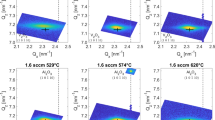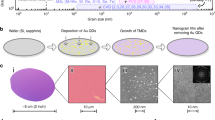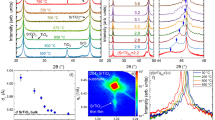Abstract
THERE has been widespread interest in thin films of metals and metalloids during the past decade because of their varied technological and fundamental scientific significance1–3. The mechanism of their formation is intimately associated with nucleation theory4 and epitaxy1 (the growth of a substance into a single crystal or well oriented polycrystalline form on a different substance as substrate); and their properties are relevant to the study of electrical, magneto-optical and catalytic phenomena1,5,6. On the physical side, much effort has been expended in assessing the influence of such factors as the symmetry, lattice spacing and temperature of the substrate in the growth of epitaxial films. On the chemical side, it has recently been recognized that, although evaporated films have greatly stimulated the study of heterogeneous catalysis, the crystallographic heterogeneity of misoriented polycrystalline or amorphous films complicates interpretation of adsorption phenomena, and makes comparison invidious with field ion and other studies which utilize single crystals.
This is a preview of subscription content, access via your institution
Access options
Subscribe to this journal
Receive 51 print issues and online access
$199.00 per year
only $3.90 per issue
Buy this article
- Purchase on Springer Link
- Instant access to full article PDF
Prices may be subject to local taxes which are calculated during checkout
Similar content being viewed by others
References
Pashley, D. W., Adv. Phys., 14, 327 (1965).
Francombe, M. H., and Sato, H., Single Crystal Films (Pergamon Press, 1964).
Anderson, J. C., in The Use of Thin Films in Physical Investigations (edit. by Anderson, J. C.) (Academic Press, 1966).
Rhodin, T. N., in The Use of Thin Films in Physical Investigations (edit. by Anderson, J. C.), 187 (Academic Press, 1966).
Heavens, O. S., and Miller, R. E., Proc. Roy. Soc., A, 266, 547 (1962).
Thomas, J. M., and Thomas, W. J., Introduction to the Principles of Heterogeneous Catalysis, chap. 3 (Academic Press, 1967).
Francombe, M. H., in The Use of Thin Films in Physical Investigations (edit. by Anderson, J. C.), 37 (Academic Press, 1966).
Sommer, A., J. App. Phys., 37, 2789 (1966).
Rosenblatt, G. M., J. App. Phys., 38, 888 (1967).
Baumann, F., Kessler, J., and Roessler, W., J. App. Phys., 38, 3398 (1967).
Mader, S., in The Use of Thin Films in Physical Investigations (edit. by Anderson, J. C.), 439 (Academic Press, 1966).
Yu, R. M., Phil. Mag., 13, 1167 (1967).
Jona, F., Surface Science, 8, 57 (1967).
Lonsdale, K., Nature 217, 56 (1968).
Sears, G. W., and Hudson, J. B., J. Chem. Phys., 39, 2380 (1963).
Thomas, J. M., and Walker, P. L., J. Chem. Phys., 41, 587 (1964).
Author information
Authors and Affiliations
Rights and permissions
About this article
Cite this article
ROBBINS, K., THOMAS, J. Production of Epitaxial Films of Antimony on Disordered Substrates. Nature 217, 1251–1252 (1968). https://doi.org/10.1038/2171251a0
Received:
Issue Date:
DOI: https://doi.org/10.1038/2171251a0
Comments
By submitting a comment you agree to abide by our Terms and Community Guidelines. If you find something abusive or that does not comply with our terms or guidelines please flag it as inappropriate.



